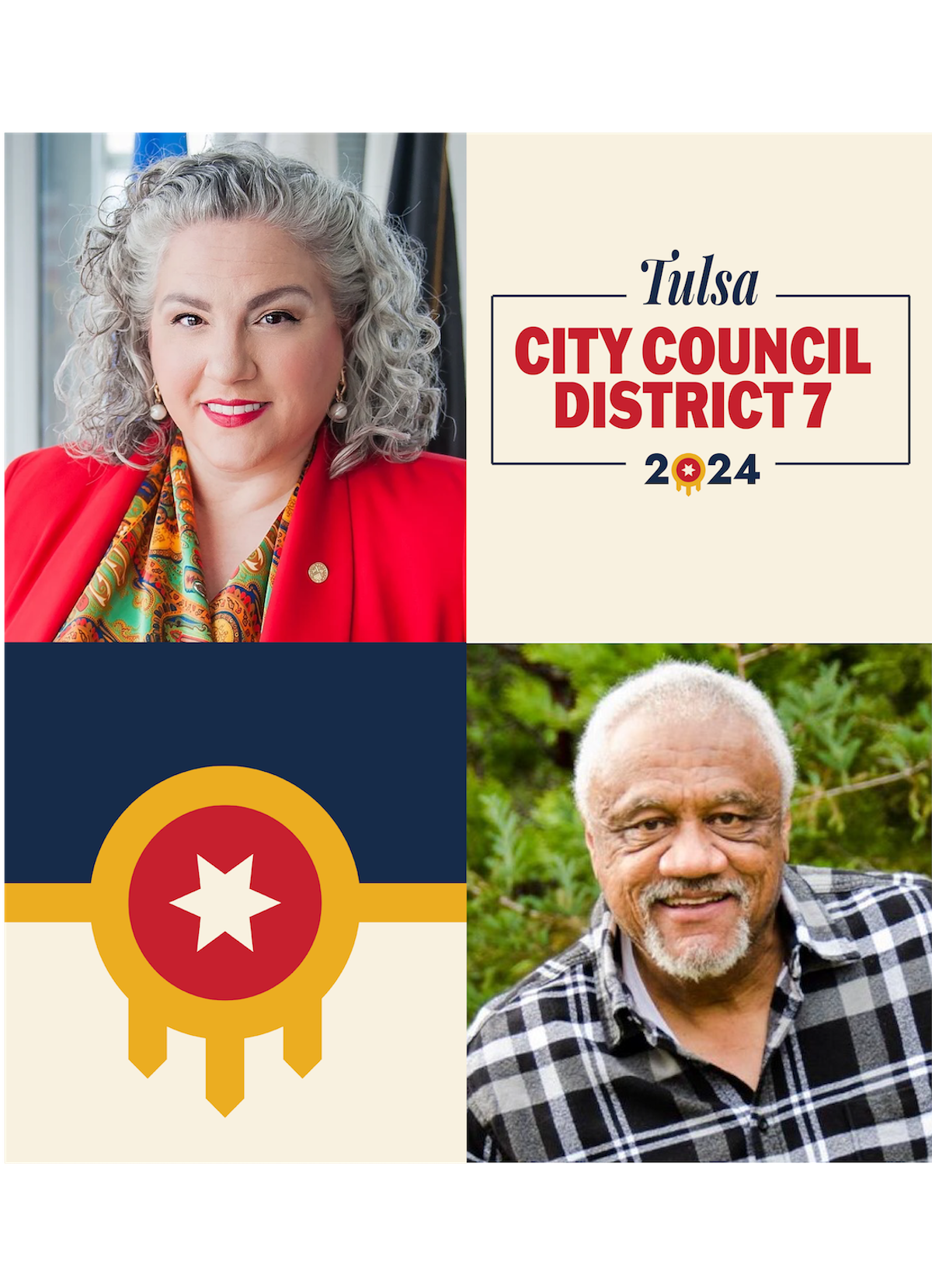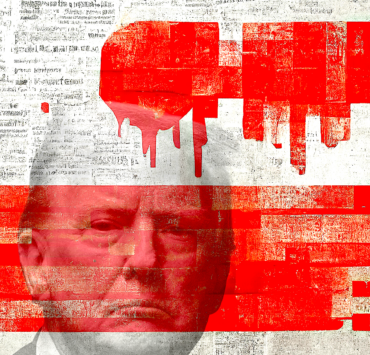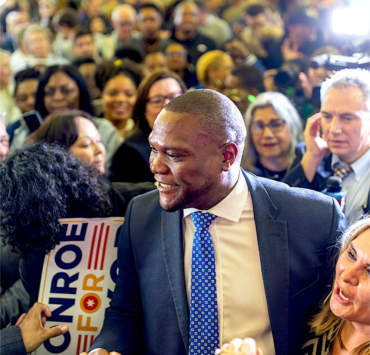
POLITICS
Kimberly Marsh
Illustration, The Oklahoma Eagle
Wright and Huff face off in District 7
Eddie Huff, a Tulsa businessman who was a regular on a conservative talk show for 12 years, is seeking a vital seat on Tulsa’s City Council.
Huff is challenging District 7 incumbent Lori Decter Wright, who has been on the Council since 2018, representing Southeast Tulsa. Wright, who is considered by her supporters to be a progressive, nonpartisan, knowledgeable and balanced leader, has been challenged before. With its boundaries in the area of South Sheridan Drive to South Garnett Road bordering Broken Arrow and East 41st to 101st Streets, District 7 is a vital area of Tulsa.
Tulsa City Council District 7 is known for its busy arterial streets and retail spaces, including Tulsa’s largest mall, Woodland Hills, and the 71st Street retail corridor. The district plays a significant role in the city’s tax revenue, contributing millions in sales tax annually to fund general operations, including street maintenance, police and fire, and an extra penny to support capital improvements.
The tax revenues are key because municipalities in Oklahoma are restricted by law to fund general services through sales taxes only. In Tulsa, the sales tax is an 8.5 percent total, of which the State of Oklahoma receives 4.5 percent, Tulsa County (funded primarily by property tax) receives 0.367 percent and the City of Tulsa receives 3.65%. Tulsa is one of the largest sales tax generators in the state as one of two major metro hubs. The City’s total budget reached a total of $1 billion within the last five years.
Tulsa historically competed with similar-sized cities such as Wichita and Omaha. But as the suburbs around Tulsa grow, the city has had to become even more competitive to attract industry and retail. For example, an outlet mall proposed by Tulsa was ultimately built in the Jenks City limits. While many surrounding communities were vying for the first area Bass Pro Shop, Broken Arrow received the ring.
More recently, with Wright’s support Tulsa attracted a major retailer, Tulsa SHEELS at Woodland Hills Mall. The sporting goods store opened its retail experience with 319,000 square feet of space that features family attractions – a 56-foot Ferris wheel, a 16,000-gallon saltwater aquarium with more than 600 fish, a wildlife mountain, and Fuzziwig’s Candy Factory.
Nonpartisan Government
While Huff is a registered Republican, he says he is more of an Independent. When asked about the view of the current Republican presidential candidate, he said he does not really understand what MAGA is. And he is not a fan of all of Trump’s vitriol about the U.S.
”I’m a conservative Republican, but I don’t necessarily support everything Donald Trump [does],” he said in an interview with The Oklahoma Eagle. “I don’t support anything anybody does. I’m honestly…probably more of an Independent. There’s kind of a real battle within the Republican Party. We’re not as united…I’ve been able to unite both sides on my behalf, because I have friends on both sides, and because I really don’t take a side.”
Wright said she is committed to nonpartisanship, which is also meant to define Tulsa municipal elections. The elections were changed under Mayor Dewey Bartlett from party affiliations to nonpartisan candidates with the idea to keep national politics from influencing local races. This year there are four Tulsa run-offs on the Tulsa ballot, including two democrat mayors and three council districts. “I really am committed to serving in a nonpartisan capacity… it’s a little frustrating talking about both sides of the aisle. And I’m like, there is no aisle at City Hall. We are a circle. We are a team.”
However, the neutrality of partisanship is not at all like famously neutral Switzerland. There is no peace in either camp, and the conflict is more attributable to dark money and to each other’s vocal supporters or detractors.
Less Government
Huff wistfully recalls Tulsa in the 1990s “when it was still a beautiful city.” He is running for his first elected post by calling for less government. He is less interested in economic development that he says can be achieved through the private sector. “It (government) abdicates us from our responsibilities, like church…I believe if we would put less on the government and more on our own personal responsibility, I think we’d be at a better place.”
He emphasized the main role of government should be to govern, as he says it was originally when the first councils of civilization were formed. Government’s primary role is to protect and serve through law enforcement, fire and emergency services, he said. The government building of an economic engine for businesses and entrepreneurs just leads to too much reliance on government, he added.
Next to public safety funding, Huff said he prioritizes functional roads, traffic management, and well-maintained public areas. He compared Tulsa with nearby cities like Broken Arrow and Bixby, saying he believes the suburbs invest more effectively in foundational infrastructure before pursuing larger projects.
Learning Curve
Like most Tulsans who come into city government, Huff says it’s a complex institution and one cannot know how to navigate all the processes and procedures. They usually need a mentor who can run them through it, even if they have been in government in the past, The unofficial job description includes knowledge funding allocations, policies for code enforcement, permitting and zoning, stormwater management, trash and recycling politics, utility fees, abandoned housing, vacant land that could be used for new housing, the intricacies of ambulance service charges and closed Park community centers. It’s a gruesome list of things to learn.
Fixing Utopia
In the 1970s, there was a shining city on a hill that wasn’t part of Oral Roberts University. It was on the corner of 61st Street and South Memorial Drive, near the brand-new Woodland Hills Mall. It was called The Falls and resembled a waterfall cascading down the hill. Forty years later, it became an example of what happens when private absentee landlords do not take care of their property and ultimately abandon it.
In 2021, the neglected property owned by several layers of LLCs, according to a Griffin Media report, became uninhabitable and one of the most problematic properties in Tulsa. Tulsa’s Shangri La of the 1970s became the city’s Pompeii, destroyed by fire and water. The Vista Shadow Mountain Apartments was a shadow of its former self, a fire and structural hazard and had to be quickly shut down even while the pandemic was still sweeping the country. Tenants were faced with moving out of the unstable, unsafe complex within a short period of time, and the place was boarded up. It remained a place for squatters and became an eyesore for the corridor. It was a sign of the faded glory of the South Memorial Drive corridor.
All there is to do now is to wait on the absentee owner to take responsibility for the mess or find a buyer to redevelop the lot.
The question is, should the city really play a role in economic development?
Wright agrees that the abandoned Vista is an important safety and economic issue for the district. She said the city has taken action to prevent further decline and potential crime. But those new to government may not realize there is a longer process that the City is required to follow with private property owners to ensure due process.
“I don’t pretend to come in, you know, like I’ve got a magic wand, and I’ve got all the answers. I have to go in and see for myself,” Huff said of his learning curve.
In order to address situations like The Vista, in August 2023, Wright championed the passage of new ordinances to strengthen the city’s code enforcement for rental properties.
Huff’s campaign supporters
Huff said he decided to run after being asked many times. In this last year, Tulsa County Commissioner Kelly Dunkerley, the former mayor of Jenks and also an insurance businessman, and his Deputy Commissioner Darren Gantz, also of Jenks, also an insurance professional finally played the right card to get Huff to run for office. The campaign kickoff was a who’s who of Republican insurance executives. Oklahoma Insurance Commissioner John Doak hosted the party. Other patrons included Lt. Gov. Matt Pinnell, also of Jenks, and John O’Connor, former attorney general and State Rep. Mark Tedford.
Who is Eddie Huff?
Huff, born to a German mother and African American soldier who served in occupied Germany during World War II, came to Tulsa via Philadelphia and other stops after his father was finally allowed to return to Germany to take Eddie and his mother home to the U.S. In Philadelphia, Eddie found a much different urban environment from the small Bavarian village where he spent his first five years of life. He learned to survive through gangs and drug deals, all the way through Texas Tech where he played football. Eventually Huff met a man in a coffee shop who led him to become a born-again Christian. He created his insurance business and realized he had a gift for gab, siding up to Pat Campbell in KFAQ Radio, where government officials winced and shuddered when they received the call to appear on the show. Huff has raised his family in Tulsa. He attributes their success not to special incentives, but to hard work and determination.
The same philosophy he used for child rearing holds true for Huff’s views on reparations. He said his idea of reparations for survivors or descendants are not aligned with that of many Tulsans. “Things happen and you just have to try harder,” he said, He compares it to a time when his son told him about the B he made in math in high school. Huff didn’t say a word. But his son worked harder to become the success he is today, Huff said.
“It just bothers me that I keep hearing these people say that it was the “riot” in ‘21 that is causing all the problems today. When, when we know that it became more prosperous, and what people should be focusing on is the North Tulsa businessman, the black businessmen that got together and saved North Tulsa after the massacre.
Who is Lori Decter Wright
Wright has more than five years of experience working with City budgeting and policy. She is well-spoken on the details of all City business, and she shared with The Oklahoma Eagle her insights on several areas. An operatic singer, she is the executive director of the Tulsa Opera.
The issues
Road and Infrastructure Projects
- Wright has supported a TIF district for the 71st Street corridor “that will begin generating some revenue to reinvest.”
- On road improvement, Wright is a critic of the Pavement Condition Index system that puts more resources into rehabilitating crumbling roads and less into maintenance to prevent disrepair. “I do think we’re going to have to come up with a better strategy than just saying, if your street’s crumbling, it’s going to continue to crumble… I do think we need to address it.”
Housing Issues
- Wright emphasizes housing challenges, saying, “Housing is a total community response… At every level we’ve stagnated over the last 10 to 20 years,” and she supports diverse solutions like quadplexes and townhomes. She mentioned that “home prices have doubled in the last four years” and tied this to wider impacts, such as eviction and workforce issues.
Public Safety
- Wright underlined the importance of public safety funding and grants, noting, “The departments who can successfully write grants get the dollars… police and fire are doing a great job of that.” She advocates for bringing in dedicated grant writers to secure funding for improvements in public safety.
Permitting Process and Bureaucracy
- Wright critiques the permitting process, noting that past reforms “sometimes aren’t practical if you put these tools in place, but they can’t use them, or don’t know how, or it doesn’t make sense.” She emphasizes the need for a “collaborative” approach to reform and practical solutions that involve the input of the people affected.
Addressing Panhandling and Homelessness
- Wright was part of bringing in The Better Way program, a panhandling initiative designed to give the unhoused a hand up, rather than a handout. While the program has made some progress, motorists see people on nearly every major street median and street corner. Some are there to collect a few dollars, but others are there because they were approached by faith-based organizations that bring people to the street to panhandle in exchange for shelter and food to give their collections to the organization in what sounds very much like trafficking. Wright encourages Tulsans to change how they give by looking for signs on the medians encouraging motorists to text donations to the coalition that helps the unhoused, A Way Home for Tulsa, instead of handing money directly to panhandlers
Equity and Reparations
- Wright served on the committee to appoint Beyond Apology Commission members and she advocates for an equity-focused approach to reparations. “Housing is very much aligned to it. Education is aligned to it. Entrepreneurship, generational wealth building through land and housing.” She stressed that “the community needs to lead it. “We all win when everyone’s doing well.”
Huff said he views reparations in a very different way – not as a payment but as a way of living, where Black business people go into other communities to make their money, then bring it back into the Black community. “So I think the best way to get reparations, if you will, or to turn things around, is to encourage Black investment, Black businesses, Black entrepreneurship and job growth, i to go out into the other communities, and then if you want to come back into the community and spend your money, invest your money there, then that’s how you do it. And so, I think as far as reparations, we’re going to keep spending money. It was Booker T Washington’s philosophy, that we had to be able to show that we can compete.”










